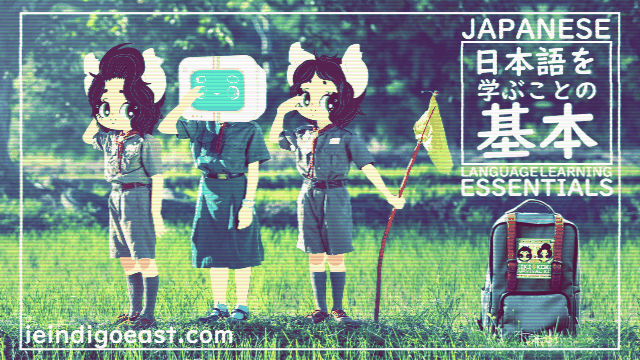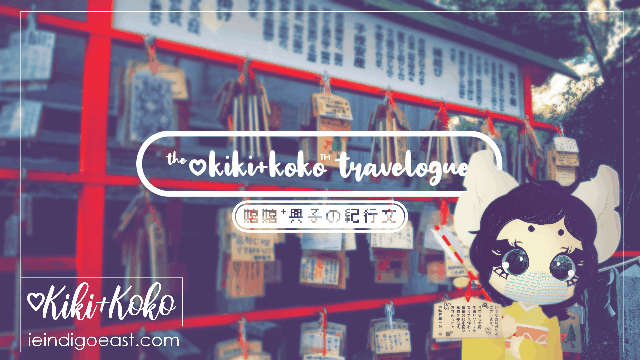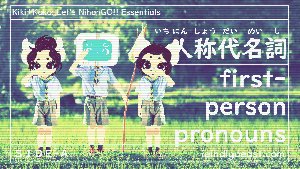(Full Title: 🔊I Want to Tell You | Focus: 出身はどこですか? Where are you from?| Earth Countries in Japanese | America + Trick to Every Demonym + Language Name in Japanese| | Basic Answers (First Meeting) | 基本的な答え (初対面) || Kiki+Koko: Let’s NihonGO!! Japanese Language Learning Essentials )
皆様、こんにちにゃあぁ!Welcome to Kiki+Koko: Let’s NihonGO!! Online! We’re Kiki+Koko, your guides to Japanese language and culture. We’ll travel the globe to make sure you have all of the tools you need to survive in Japanese language. In order to learn more Japanese language, you may have learnt even more about the whole world around you! This journey began with a simple question that can result in an abundant number of other questions and answers even more numerous than one may have imagined! We began in Asia, giving you new questions and answers, with QUIZBO™ reading them aloud for you. We flew over to Europe where we gave you new questions and answers about your travel plans as well as your previous destinations. From there, we continued to continent of Africa where the countries… there were so many countries. Many of the names differ from the way you may have even predicted they would be said based on their English equivalent. Many people say that the Japanese versions of country names are simply the regular name of the country localised into Japanese or accented in that way. But, honestly, there is quite a difference with many countries even outside of Southeast Asia. There are even countries with actual Japanese names, not simply adapted. But, if anything, it’s a bit difficult to predict the names even if you think you’ve found the pattern. But, the positive note in all of this is that there are some answers that are extremely predictable!
When you were learning the countries— or at least looking over the countries, we honestly don’t expect you to memorise all of them right this moment, but it’s a neat goal— you were actually learning more than you realised! We continued to hint at this throughout the series of resources so far, but the time has come for answers. In Japanese, there is a wonderful and consistent trick that is even more useful than in English!
Demonyms:
Would you like to state that you’re a citizen of a certain country, city, or province? No need to fiddle with ~ish, ~ian, or ~ese. All you need are two little strokes making up the kanji: 人. Read alone as hito, meaning person, when added to the end of a place name, it becomes jin. Let’s try it out for a few of the previous countries we’ve learnt!
Japanese (person) = 日本人, nihonjin
English (person) = イギリス人, igirisujin
Korean (person) = 韓国人, kankokujin
Martian= 火星人, kaseijin
This oddly assists in differentiating whether you’re talking about a person or a language. However! If you’re talking about an object that is from a country, like a Japanese car or an Australian drink, you use the possessive particle の, no. It’s a common and understandable mistake many people make when they’re first using these, as of course, in languages like English, many times, the word used for the language is the same as the demonym, which is basically a word denoting a person from a particular place.
Japanese car = 日本の車, nihon no kuruma
German company = ドイツの会社, doitsu no kaisha
Egyptian clothing= エジプトの服, ejiputo no fuku
This also works for entire continents as well. If you have any specific questions on specific countries, continents, cities, etc, you can leave a comment below~!
Languages:
Is there a country that has a language named directly after it? It’s luckily not-so-difficult to identify or say a language in Japanese! Just add ~語, go!
Chinese (language) = 中国語, chuugokugo
Arabic (language) = アラビア語, arabiago
Swedish (language) = スウェーデン語, suueedengo
So, obviously, this wouldn’t work with languages that aren’t tied to a country such as スワヒリ語, suwahirigo, or Swahili or アイヌ語, ainugo, or Ainu language. But, it still takes away the need for differentiating betwixt suffixes like ~ish, ~ian, or ~ese. Instead, they simply all end in 語, go, which gets rid of the guess-work.

Learn how to use languages in a sentence with this Word of the Week hosted by your good robo-friend-o, QUIZBO™ with 話す and 英語
Again, we said this was totally consistent, but…in some cases, it’s not as simple as adding it to the country name itself. This is why we included the kanji in the other lessons as to not throw this at you without a catcher’s mitt. So, while every language can mostly be named by the country, where the country actually has its own language and isn’t broken into different languages or languages from another country—but we’re simplifying it for your basic understanding— there are some languages that don’t technically follow this rule, yet in a way they do. Remember how we mentioned that some countries use kanji and that each of them have abbreviations for the country based on that kanji? Well, it was there in one of the previous lessons—no worries, we’re here to explain it a little more, now. Anyway, that abbreviation we mentioned is found in some country language names. This is mostly prevalent in a vocabulary word QUIZBO™ has covered: namely, English, otherwise known as 英語, eigo. But, wait, you may be saying, What country is Ei, and if it’s from England, why isn’t it イギリス語, igirisugo??? To which we would reply… Hold your horses, we’re literally explaining that right now, silly, but very astute observation.
So, as we mentioned, イギリス, is actually spelt 英吉利 in kanji. See our friend 英 coming back to play? Well, initially, the characters were randomly assigned by sound in Chinese characters, aka kanji, rather than by meaning, which wouldn’t be so terrible either, considering the kanji roughly translates to: outstanding good luck advantage. We’ll cover the whole idea of these randomly assigned characters in future, as that would be more of an in-depth analysis than an essential for now. Well, technically, everything is important and builds upon each other, but we do want to be sure to keep things within everyone’s reach and don’t want to overload anyone with too much information at a time. But, to make a long story shorter, the abbreviation of England is 英 which results in English becoming 英語.
So, as you can probably see, this has all been building up to quite a lot of educational material!! We didn’t write out and code the countries of the world so far for only one purpose, but three and more! So, when you’re looking at the countries this lesson as well as when you’re revising / reviewing the previous lessons, you can rest assured, you’ll be multitasking with all of the other concepts you’ll be memorising passively. At any rate, you can always take your time and return at any time if anything is too much to absorb in one sitting, which, again, it’s all meant to give you assistance at any level.
Welcome back, if you just took a trip around the world of Kiki+Koko: Let’s NihonGO!! Essentials, but if you think you have a good grasp on all of it and you’ve simply scrolled down, then hello, again! Before we JuMP RIGhT iNto tHIs, it’s time we gave you some more essential information and remind you of a tiny bit in case you skipped the revision/review.
Quick Introduction
Previous Related Question and Answers:
In these previous lessons, you can learn how to ask questions like: Where are you from? What country are you from? Which country are you from? and Which country do you come from? Be sure to go to the ‘Countries of Asia’ lesson for the latter four. For Where do you want to go? Where do you plan to travel? and Where have you travelled? along with answers to these questions, you can go to ‘Countries of Europe’. Travelling the world for answers is only a click or tap away. You can simply leave them open in another window or on a mobile device or tablet.
For your convenience, we’ll give you the main focus question again.
Q: Which country are you from?
(あなたは) どこの 国の 出身ですか。
(あなたは) どこの くにの しゅっしんですか。
(anata wa) doko no kuni no shusshin desuka?
A: I’m ______.
(私は) ○○人です。
(わたしは)○○人です。
(watashi wa) ○○jin desu.
(Then you can fill in the blank with the place to make a demonym)
Basic Answers: Where are you from?
| 基本的な答え: 「出身は どこですか。」
Countries | 国々
These are in Japanese ‘alphabetical’ order. But, if you’re just looking for one specific country, or you’re revising/reviewing, you can use ‘ctrl+f’ on your keyboard on PC to open the finder, then type in the country name in English, or on mobile, open the ‘find in page’ on your respective browser options. Also, we’ll be sure to list these countries/territories by region.
北アメリカ|North America
大陸地域 | Continental Region
America
亜米利加 (アメリカ)【あめりか】amerika
United States of America
アメリカ合衆国 【あめりかがっしゅうこく】amerika gasshuukoku
Canada
加奈陀 (カナダ)【かなだ】 kanada
Mexico
墨西哥(メキシコ)【めきしこ】 mekishiko
地峡地帯 | Ithsmus
Belize
ベリーズ【べりーず】 beriizu
Costa Rica
コスタリカ【こすたりか】kosutarika
El Salvador
エルサルバドル【えるさるばどる】 erusarubadoru
Guatemala
グアテマラ【ぐあてまら】 guatemara
Honduras
ホンジュラス【ほんじゅらす】honjyurasu
Nicaragua
ニカラグア 【にからぐあ】 nikaragua
Panama
パナマ【ぱなま】panama
バハマ諸島 | Panama Archipelago
Bahamas
バハマ【ばはま】 bahama
Turks and Caicos
タークス・カイコス諸島【たーくすかいこすしょとう】 taakusu kaikosu shotou
大アンティル諸島 | Great Antilles Islands
Cayman Islands
ケイマン諸島【けいまんしょとう】keimanshotou
Cuba
キューバ【きゅーば】 kyuuba
Dominican Republic
ドミニカ共和国【どみにかきょうわこく】 dominikakyouwakoku
Haiti
ハイチ 【はいち】 haichi
Jamaica
ジャマイカ【じゃまいか】 jamaika
Navassa Island
ナヴァッサ島【なヴぁっさとう】 navassatou
Puerto Rico
プエルトリコ【ぷえるとりこ】puerutoriko
小アンティル諸島 | Lesser Antilles
Anguilla
アンギラ【あんぎら】 angira
Antigua and Barbuda
アンティグア・バーブーダ【あんてぃぐあ・ばーぶーだ】antigua baabuuda
Barbados
バルバドス【ばるばどす】 barubadosu
British Virgin Islands
イギリス領ヴァージン諸島【いぎりすりょう ゔぁーじんしょとう】 igirisuryou vaajinshotou
Grenada
グレナダ 【ぐれなだ】 gurenada
Guadeloupe
グアドループ【ぐあだるーぷ】guadaruupu
Martinique
マルティニーク【まるてぃにーく】 maruteniiku
Montserrat
モントセラト【もんとせらと】 montoserato
Saint Berthelemy
サン・バルテルミー【さん・べるてるみー】 san beruterumii
Saint Kitts and Nevis
セントクリストファー・ネイビス 【せんとくりすとふぁー・ねいびす】sentokurisutofaa neibisu
Saint Lucia
セントルシア【せんとるしあ】 sentorushia
Saint Martin
ジブチ【じぶち】 jibuchi
Saint Vincent and the Grenadines
エリトリア 【えりとりあ】 eritoria
Sint Maarten
シント・マールテン 【しんと・まーるてん】 shintomaaruten
Trinidad and Tobago
トリニダード・トバゴ【とりにだーど・とばご】 torinadaado tobago
United States Virgin Islands
アメリカ領ヴァージン諸島【あめりかりょうゔぁーじんしょとう】 amerikaryou vaajinshotou
その他 | Other
Greenland
グリーンランド【ぐりーんらんど】 guriinrando
Saint Pierre and Miquelon
サンピエール・ミクロン【さんぴえーる・みくろん】 sanpieeru mikuron
Aruba
アルバ【あるば】 aruba
Curaçao
キュラソー【きゅらそー】 kyurasoo
Bermuda
バミューダ諸島【ばみゅーだしょとう】 bamyuudashotou
We hope you’ve enjoyed your Japanese language trip around North America! There weren’t as many countries as the previous ones, so we made sure to fill you in with even more useful facts so you can continue to return for more! Remember, many of these lessons are meant to be returned to; in other words, it’s quite a bit of information to memorise in one go and it’s much more efficient to continue to return, but there’s enough information that you can return in future and get even more from it than the first time you read it! So, don’t be a stranger, you can return as many times as you wish.
On top of that, whilst there were fewer countries, if we ended up missing yours, we apologise and humbly request you leave a comment below to let us know! We may learn something new! As two cat-like alien Japanese teachers and a Heisei era computer robot, there’s still always more to learn about planet Earth. And, we definitely wouldn’t want to make anyone feel left out.
We do hope that this will be helpful to you in your Japanese studies! See, we told you that you would be learning more than one skill at once. We hope the build-up with worth it. Now, there are plenty of past and future countries to which you can apply this new tool which you can keep in your Japanese language learning kit! But, to make sure you get the next bits of essential language learning skills, be sure to support the site and the future of learning by subscribing to the Electronic Mailing List of Tomorrow, today, found usually at the bottom of the site page or the sidebar on desktop. You’ll get the latest tools and resources to surviving in Japanese language in straight to your inbox. That’s articles, videos, podcasts, and more.

Grooving to the content we’re creating? You can leave a TIP in the TIP♡JAR to keep it going!
(Can’t? No worries! The content is free for everyone! We’re just glad you’re here!! Bring friends if you like~!)
Also, we want to make sure we can continue to offer this, the full story, and even more content for months and years to come whilst also surviving with food and shelter. It’s usually one or the other, otherwise. If you want to ensure our survival as well as the continuation of the creation of new and even better content, feel free to leave a TIP in the TIP♡JAR to keep it going, or for long term contributions in increments, you can join our Patreon where our gracious host, Indigo East, usually posts behind-the-scenes, sneak-peeks, exclusive content, and more. And, we join in as well! Again, if you’d like to support our survival and the creation of more content to be made available to as many people as possible, you can also share the content! You can easily share via Twitter and Pinterest where you can retweet and repin respectively without even having to type! Gestures like that go a long way, and we appreciate it.
Thank you for joining us! We hope that you continue with us on this adventure, and we appreciate that you’ve chosen us to assist you on your Japanese learning journey!
♡Kiki+Koko






Assist our friendly world domination and follow us via The Internet.









































3 replies »